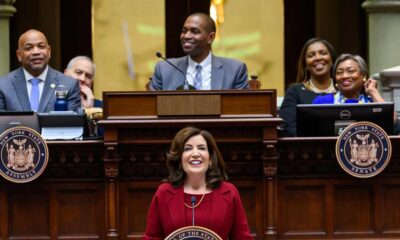Justice Matters
New York Law Protects Homeowners from Statute of Limitations Abuse in Foreclosure Proceedings

By Mary Alice Miller
Dewey Doughtry bought his home in Bed Stuy 30 years ago. In the past fourteen years, he has experienced foreclosure proceedings which resulted in three judgments with prejudice in his favor, meaning the cases were over and done with, once and for all, and can’t be brought back to court. Yet time and again, Doughtry was brought back to court after the six-year statute of limitations on foreclosure had run out, with demands that he agree to a modification which he refused. Doughtry said when he asked the courts to enforce the judgment, “The courts denied me.”
During this time, he faced numerous hardships, including being prevented from refinancing his home. Doughtry says the lenders violated the Truth in Lending Act.
“People in Bed Stuy need to wake up,” said Doughtry. “Many people have lost their homes. Don’t let people take your property.”
On December 30, 2022, Governor Hochul signed the Foreclosure Abuse Prevention Act, which became effective immediately.
The new law applies retroactively to any pending foreclosure files before December 30, 2022, where a final judgment and order of sale have yet to be enforced.
A unilateral action by a lender or servicer does not extend the statute of limitations for a foreclosure action, and the lender or servicer is time-barred from foreclosing the mortgage after six years from the date the lender or servicer accelerated the loan.
The new law amends New York’s Real Property and Proceeding Law § 1301 (often referred to as the “Election of Remedies” statute) to provide that once the statute of limitations bars a foreclosure action, a lender or servicer is prohibited from bringing a separate action to recover a personal judgment against the borrower on the promissory note.
A loan owner or servicer is only permitted to assert that acceleration was invalid if a prior foreclosure action was dismissed based on a court ruling that the acceleration was invalid.
Lobbying by advocacy groups, concerned citizens, and elected officials at all levels of government was prompted to push for the law when in 2021, the New York Court of Appeals decided in Freedom Mortgage Corporation v. Engel that lenders in the foreclosure process can have flexibility regarding the statute of limitations. Sometimes, the clock on the six-year timeline can be restarted multiple times, dragging on foreclosure lawsuits for years.
Senator James Sanders and Assemblywoman Helene E. Weinstein sponsored the bill. “It is imperative that we have a fair and just foreclosure process,” said Sanders. Weinstein said, “This important law will protect homeowners by preventing mortgage lenders from getting an unfair and unwarranted second bite of the mortgage foreclosure apple. The deck has long been stacked against homeowners due to a highly flawed mortgage foreclosure process, and this bill will go a long way to adding back some fairness to the process.”
A statement from the New York Senate explains why the law was needed: “The New York Court of Appeals inadvertently and effectively struck down the statute of limitations in the foreclosure process – elevating this standard to the same as murder, which has no statute of limitations. The statute of limitations standard needed to be restored. This law restores the statute of limitation standard as it was since 1965 by bringing back reason and justice in the foreclosure process.”
The statement continued: “Before this law when into effect, mortgage lenders had the unilateral ability to manipulate and evade statute of limitations, which no other litigant enjoys in New York. The new law does not disturb New York’s six-year statute of limitations on mortgage foreclosure actions. It simply restores a common-sense principle: no party may unilaterally stop and restart the statute of limitations to revive what would otherwise be a time-barred action. This law ensures the fair application of the statute of limitations.”
Jacob Inwald, Director of Foreclosure Prevention Legal Services NYC, said, “The enactment of the Foreclosure Abuse Prevention Act will go a long way towards preventing foreclosing lenders from manipulating statute of limitations at the expense of New York’s struggling low- and moderate-income homeowners, concentrated in New York’s communities of color, and will ensure that banks and other Wall Street financial institutions are not excused from the longstanding statute of limitations principles that govern any party pursuing a claim in court. Foreclosing lenders who botched thousands of foreclosure actions over the last decade and longer were hardly deserving of the special treatment under the statute of limitations that some appellate decisions had granted them, which had the effect of reviving countless foreclosure cases that were abandoned long ago and casting a pall on the title to properties across New York State. With the restoration of the law that the Foreclosure Abuse Prevention Act, the law will be restored and foreclosing lenders will have to comply with the same statute of limitation principles that govern anyone pursuing a claim in court.”
The real estate industry may not like the law’s constraint on abuse of statute of limitations in foreclosure proceedings.
An article in the New York Law Journal states that the Foreclosure Abuse Prevention Act violates both Substantive Due Process under the Fourteenth Amendment and the Contracts Clause. According to the article, “A lender can challenge the retroactive application of the [Foreclosure Abuse Prevention] Act because the Act arguably has no limits and upsets a lender’s prior reliance on Engel to rebut a statute of limitations defense, restore previously dismissed actions and start new actions. Moreover, the Legislature indicated that the main purpose for its passage was to overturn Engel. At the same time, the Legislature may disagree with the Court of Appeals’ decision. Its knee-jerk reaction to overturn Engel is not a persuasive reason for the harsh impact of retroactivity. Thus, the Act is not justified by a rational legislative purpose and arguably violates the Due Process Clause under the Fourteenth Amendment.”
In addition, the Law Journal article argues that “…the Act substantially impairs the contractual relationship between lender and borrower by completely extinguishing a lender’s contractual right to unilaterally revoke acceleration. In addition, the Act does not appear to serve a significant or legitimate purpose (under Contracts Clause).”
The Law Journal article predicts that “the Act will be litigated.”
Doughtry praised Hochul for signing the bill into law. When asked if he thinks the new law will help homeowners like himself, Doughtry said, “The law will help if they abide by the law.” He added, “But so far, they haven’t.”














